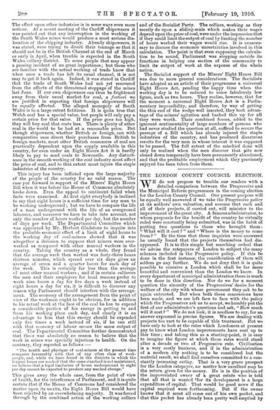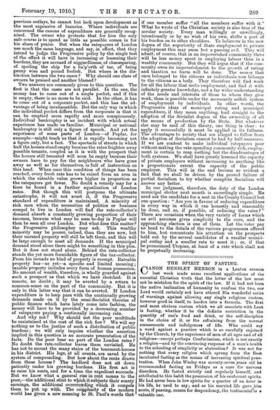THE LONDON COUNTY COUNCIL ELECTION.
WE do not propose to trouble our readers with a detailed comparison between the Progressive and the Municipal Reform programmes in the coming election for the London County Council. Our present purpose will be equally well answered if we take the Progressive policy at its authors' own valuation, and assume that each and all of their projects, if carried out, will minister to the improvement of the great city. A famous administrator, to whom proposals for the benefit of the country he virtually ruled were constantly being submitted, was in the habit of putting two questions to those who brought them: " What will it cost ? " and " Where is the money to come from ?" By the time that these inquiries were answered he usually found that the projects themselves had dis- appeared. It is to this simple but searching ordeal that we advise the ratepayers of London to subject the many schemes included in the Progressive policy. If this be done in the first instance, the consideration of them will seldom go any further. We do not deny that it is quite possible to conceive a London which shall be far more beautiful and convenient than the London we know. In every department of municipal administration there is much to be done in this direction. Nor do we for a moment question the sincerity of the Progressives' desire for the welfare of the city with whose government they ask to be again entrusted. But when both these concessions have been made, and we are left face to face with the policy which the Progressives ask us to accept, we humbly put the first of our administrator's questions and ask, " How much will it cost ? " We do not look, it is needless to say, for an answer expressed in precise figures. We are dealing with projects too vast to be capable of this treatment. But we have only to look at the rates which Londoners at present pay to know what London improvements have cost up to this time ; and taking this as a starting-point, it is easy to imagine the figure at which these rates would stand after a decade or two of Progressive rale. Civilisation is a very costly business, and if in the administration of a modern city nothing is to be considered but the material result, we shall find ourselves committed to a con- stantly increasing outlay. That is a -very grave prospect for the London ratepayer, no matter how excellent may be the return given for the money. He is in the position of the impoverished owner of a great estate who is told that all that is wanted *for its development is a large expenditure of capital. That would be good news if the capital required were forthcoming. But if the owner knows that it must all come out of his own pocket, and that this pocket has already been pretty well emptied by previous outlays, he cannot but look upon development as the most expensive of luxuries. Where individuals are concerned the canons of expenditure are generally recog- nised. The owner who protests that for him the only safe course is to spend as little as possible comes in for his share of praise. But when the ratepayers of London use much the same language, and say, in effect, that they intend to judge the Progressive policy by the single test of the effect it will have in increasing or lessening their burdens, they are accused of niggardliness, of cheesepaxing, of spoiling the ship for a ha'p'orth of tar, of being penny wise and pound. foolish. But where is the dis- tinction between the two cases ? Why should one class of owners be praised and another blamed ? Two answers are commonly given to this question. The first is that the cases are not parallel. In the one, the money has to come out of a single pocket, and if this is empty, there is no more to be said. In the other, it has to come out of a corporate pocket, and this has the ad- vantage of being inexhaustible. But the only way in which the individual pocket differs from the corporate is that it can be emptied more rapidly and more conspicuously. Individual bankruptcy is an incident with which actual experience has made us familiar. Municipal or national bankruptcy is still only a figure of speech. And yet the experience of some parts of London—of Poplar, for example—might teach us that it is rapidly becoming not a figure only, but a fact. The spectacle of streets in which half the houses stand empty because the rates frighten away possible tenants, coupled as it is with the prospect that the houses still tenanted will soon be empty because their owners have to pay for the neighbours who have gone away as well as for themselves, is full of instruction on this head. When once this condition of things has been reached, every fresh rate has to be raised from an area in .which the rateable value grows higher in proportion as the ratepayers get fewer. No doubt a remedy may for a time be found in a further equalisation of London rates. But though this will postpone the ultimate ' catastrophe, it will not avert it, if the Progressive standard of expenditure is maintained. A minority of rich men whom the necessities of politics or business compel to live in London will find the rate-collector's demand absorb a constantly growing proportion of their incomes, because what may be seen to-day in Poplar will then be seen all over London. But what does this matter? the Progressive philosopher may ask. This wealthy :minority may be poorer, indeed, than they are now, but their unrated property will still be left them, and this will be large enough to meet all demands. If the municipal demand stood. alone there might be something in this plea. But it does not stand alone. Behind the rate-collector stands the yet more formidable figure of the tax-collector. From his inroads no kind of property is exempt. Rateable property has—as yet—a specific and limited meaning ; taxable property includes every form of human possession. No amount of wealth, therefore, is wholly guarded against such a prospect as that which we have sketched. It is remote, no doubt ; it may be averted by a return to common-sense on the part of the community. But it is only in this latter way that it can be averted. If London expenditure is to keep pace with the continually growing demands made on it by the semi-Socialist theories of public finance which have lately come into fashion, the money will have to be provided by a decreasing number of ratepayers paying a continually increasing rate.
And why not? Why should not the poor multitude be maintained at the cost of the rich few ? We will say nothing as to the justice of such a distribution of public burdens ; we will only inquire whether the assertion implied in this question is an accurate presentation of the facts. Do the poor bear no part of the London rates ? No doubt the rate-collector leaves them unvisited. He has not to mount the many stairs of the tenement-houses in his district. His legs, at all events, are saved. by the system of compounding. But how about the rents drawn from these houses ? The landlord does not sit down patiently under his growing burdens. His first act is to raise his rents, and for a time the expedient succeeds. But we know what a general rise in rent means to the poor,—the additional stint to which it subjects their scanty earnings, the additional overcrolvding which it compels them to put, up with. The co4plexity of the modern world has given a new meaning to St. Paul's words that if one member suffer " all the members suffer with it." What he wrote of the Christian society is also true of the secular society. Every man willingly or unwillingly. intentionally or by no wish of his own, shifts a part of his burden on to other shoulders. To believers in the uew dogma of the superiority of State employment to private employment this may seem but a passing evil. They will admit, of course, that in an impoverished community there will be less money spent in employing labour than in a wealthy community. But they will argue that if the com- munity owes its impoverishment to the growth of rating and taxation no harm will be done. The money that once belonged to the citizens as individuals now belongs to the citizens as a body. They therefore will find work for all the labour that seeks employment, and find it with infinitely greater knowledge, and a far wider understanding of the needs and interests of those to whom they give work, than is possible under the necessarily selfish system of employment by individuals. In other words, the Progressive ideas of municipal rating and municipal expenditure, if they mean anything, lead straight to the adoption of the Socialist dogma of the ownership of all the means of production by the State. But whatever else may be said of this theory, one thing is clear : to apply it successfully it must be applied in its fullness. The advantages to society that are alleged to follow from the adoption of Socialism cannot be had by half-measures. If we are content to make individual ratepayers poor without making the rate-spending community rich, employ- ment is certain to reap nothing but the disadvantages of both systems. We shall have greatly lessened the capacity of private employers without increasing to anything like a proportionate extent the capacity of the public employer. This will in the end become so evident a fact that we shall be driven by the proved failure of partial Socialism to try whether complete Socialism will answer any better.
In our judgment, therefore, the duty of the London municipal elector next month is exceedingly simple. He need. ask the candidate for a seat in the County Council but one question : " Are you in favour of reducing expenditure in every way in which it can honestly and reasonably be done, and so, if possible, of reducing the rates ? " There are occasions when the very variety of forms which an evil assumes gives simplicity to the cure, and the approaching election is one of them. Let the voter pay no heed to the details of the various programmes offered to him, but concentrate his attention on the prospects held out by the several candidates of a smaller munici- pal outlay and a smaller rate to meet it ; or, if that be pronounced Utopian, at least of a rate which shall not be perpetually increasing.









































 Previous page
Previous page